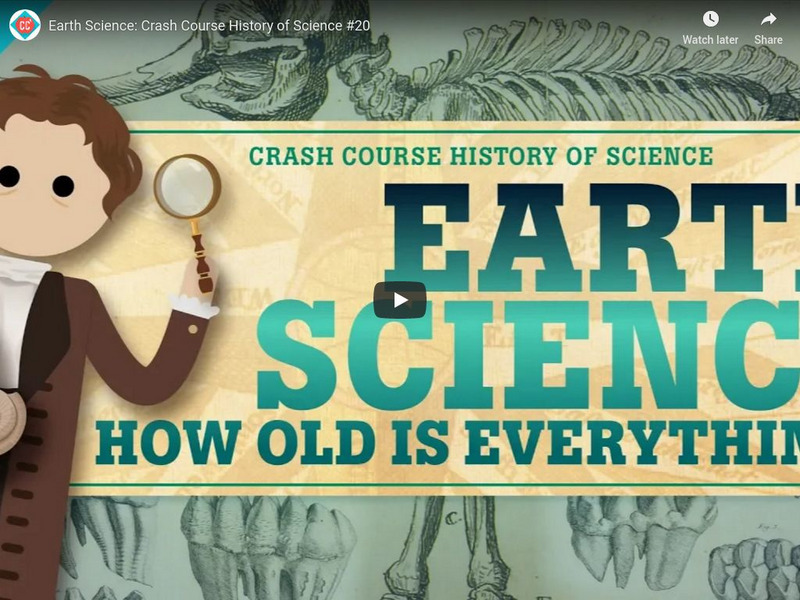PBS
A Brief History of Geologic Time
How do scientists know the history of Earth before humans—or any mammals—existed? An epic "Eons" series video explains the larger history of geologic time. It highlights the eons, eras, periods, epochs, and ages scientists use to divide...
The Brain Scoop
Fossil Sharks
Sharks contain a cartilage skeleton, rather than bone, so they rarely appear in the fossil record. The video explains why we find shark teeth and how scientists use that tiny piece of information to learn about sharks. Then, it presents...
The Brain Scoop
Fossil Meteorites
Fossils ... from space? Science scholars discover evidence in a limestone quarry that helped researchers learn about a meteor shower that lasted hundreds of thousands of years through an interesting video from Brain Scoop's Fossils and...
The Brain Scoop
Starstuff and Nanodiamonds
The Field Museum owns materials older than our sun—can you believe that? An enlightening video displays and discusses some of these. It explains where they come from, how they formed, how they survived this long, and what we know about...
The Brain Scoop
The First Brachiosaurus
How do scientists know when they've discovered something new? Travel back in time to when dinosaurs roamed the earth using an interesting video, which is part of Brain Scoop's Fossils and Geology playlist. The narrator examines the...
The Brain Scoop
The Origin of Mammal Movement: Harvard Adventures, Part I
It may be difficult for some humans to walk and chew gum at the same time ... but reptiles can't breathe while running at all! Compare the skeletal systems of reptiles and mammals in the first installment of Brain Scoop's fossils and...
Crash Course
The Hydrologic and Carbon Cycles: Always Recycle!
Introduce biogeochemical cycles and goes into detail about the hydrologic and carbon cycles. A scientific video engages learners and teaches them at the same time.
TED-Ed
The Ferocious Predatory Dinosaurs of Cretaceous Sahara
What's not to love about dinosaurs? Lucky for us humans, we can love to learn about them from 100 million years away, especially a group of extra large predatory dinosaurs from the Cretaceous period. Watch a descriptive video that...
PBS
How a Supervolcano Made the Cenozoic’s Coolest Fossils
Volcanoes cause mass extinctions, climate change, and physical alterations of our planet. They also create great fossil records, time markers in layers of Earth, and an interesting way to study geology. A video describes how one...
The Brain Scoop
Siats Meekerorum
Scientists find and name 30-40 new dinosaurs every year. A timely video discusses the siats meekerorum, one relatively newly discovered dinosaur. It explains the pieces scientists found and how they use those to better understand the...
SciShow
A Brief History of Life: Survival Is Hard
When did life start on Earth? An enchanting video introduces some of the earliest times in the history of our planet. From rocks that no longer exist to the development of oceans and plate tectonics, The resource details the first couple...
TED-Ed
Four Ways to Understand the Earth's Age
Cartoon children compare the earth's age to timescales that we understand:a calendar year, the thickness of a book, the human lifespan. This smart film clip is definitely worth adding to your geologic timescale lesson! If you subscribe...
Crash Course
The History of Life on Earth
The first life on Earth developed in the oceans. As an introduction to ecology, the video starts with the formation of the earth. It follows with the Archaean and Proterozoic Eons including protobionts, prokaryotes, and eukaryotes. It...
Curated OER
Ice Age People in Florida?
Spring breakers first gathered in Wakulla Springs, Florida, over 10,000 years ago! A video explains how geologists and archaeologists work together to uncover hidden artifacts from this time period.
Sophia Learning
Sophia: Fossils
This lesson provides a timeline of fossils while also discussing the different types, locations, and geology of various fossils. [4:13]
Annenberg Foundation
Annenberg Learner: The Habitable Planet: Many Planets, One Earth (Video)
With this resource, users learn how rocks from millions of years ago give evidence of the emergence of oxygen in Earth's atmosphere. Make the connection between this evidence and the presence of complex animal life on our planet. [28:27]
Crash Course
Crash Course History of Science #20: Earth Science
How did scientists figure out the age of the earth? Trace the history of Earth Science and the developments scientists made in determining the earth's geologic eras. Scientists asked such questions like, what's up with fossils? Are they...
















